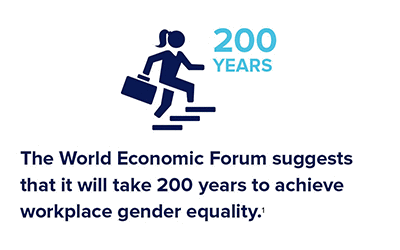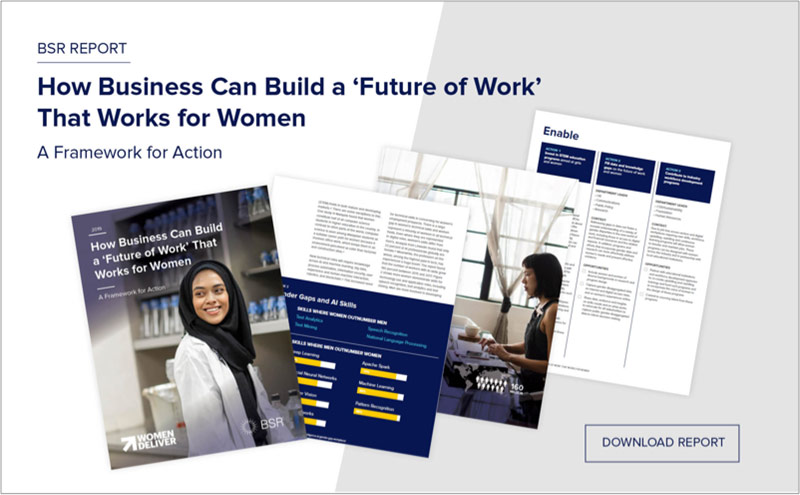Automation, artificial intelligence, the gig economy, and demographic and social shifts are changing the very nature of work. Women, who are still striving to achieve workplace gender equality, are particularly vulnerable in this time of rapid change.
As companies prepare for and respond to the changes brought about by the ‘future of work,’ we need business action to ensure that women can not only participate, but lead in the workplaces of the future. In turn, this will benefit companies by ensuring they attract and retain the best talent and build a highly skilled and innovative workforce positioned for future success.

Trends and Implications for Women
![]()
Transformation of Sectors and Roles
Disruptive technologies affect both the quantity and quality of women’s jobs while existing systemic constraints impact the ability of women to transition into new sectors and the roles of tomorrow.
![]()
Demand for Digital Skills
The workplaces of the future will require new skills. The lack of women in STEM fields and gaps in technical skills could hold women back from important roles as developers of our future digital systems and tools.
![]()
The Rise of New Work Models
Contingent work and new gig economy opportunities are disrupting traditional work models. While providing some flexibility for women workers, these work models also present new challenges with increased violence and harassment, unpredictable hours, and unequal wages and benefits.
Photo: Iya Forbes, Getty’s Project #ShowUs collection
To help women successfully transition and thrive as the very nature of work changes, companies need to design inclusive 'future of work' strategies that address both systemic challenges women at work face and the new challenges presented by new work structures and gaps in social protections.
Creating a ‘future of work’ that works for women will require companies to:
- Act by adjusting policies and practices to be inclusive, free of bias, and responsive to the changing nature of work;
- Enable opportunities for women by collaborating with peers, government and educational institutes, and civil society;
- Influence by leveraging their government and public relations to drive attention to issues of gender equity.
What Companies Can Do
![]()
Act
Adjust employment plans, policies, benefits, trainings, and products within a company’s operations and supply chain to be inclusive, free of bias, and responsive to changes presented by the changing nature of work.
Enable
Partner to address areas critical for women’s future economic success including: STEM education, digital access, entrepreneurship support, and online safety.
Influence
Demonstrate leadership through advocacy and communications efforts to build an environment that promotes gender equality and removes systemic constraints for women to fully participate in the new world of work.
Photo: Kethy Wang, Getty’s Project #ShowUs collection
Gains women make in employment benefit societies and economies overall. As such, businesses have a responsibility not only to help workers prepare and transition for this ‘future of work,’ but also enact strategies that create positive change and economic advances for women.
And the time for action is now.
Decisions made today will bring significant consequences for women’s advancement long into the future. Without action, companies risk prolonging gender disparities in the workplace. On the other hand, with intention and focus, companies can shape a radically different future for working women.

Photo: Getty’s Project #ShowUs collection
Call to Action
Commit to workplaces that are free from bias and harassment, where women are encouraged to enter technical and high-paying roles essential to future business success.
Integrate gender-disaggregated data into decision-making and share evidence on how the 'future of work' trends are impacting women and how companies are taking action.
Build AI tools and systems that are free from bias, are developed by diverse teams, and are used in non-discriminatory ways.
Launch partnerships that address gender gaps in education and digital access to prepare girls and women for the roles of tomorrow.
Promote public policies that provide protections for women workers and a reworking of the social contract to deliver advances in quality employment for women across industries.
Let’s talk about how BSR can help you to transform your business and achieve your sustainability goals.






